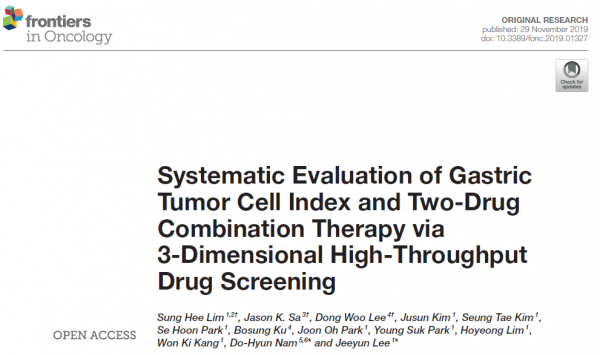Paper 2019, Frontiers in Oncology, Systematic Evaluation of Gastric Tumor Ce…
Page Info

Contents
Abstract
Tumor heterogeneity greatly limits personalized treatment of cancer. Patient-derived tumor cell (PDC)models precisely recapitulate themolecular properties and biology of the disease, making them effective preclinical tools for assessing anti-cancer drug activities. Accurate estimation of tumor purity is essential for performing high-throughput drug screening (HTS). In the present study, we measured and predicted the tumor population index in PDC models for two-drug combinational strategies using HTS system. Gastric cancer cell-lines and PDCs were subjected to multi-color immunofluorescence analysis against EpCAM and vimentin to evaluate the tumor cell index based on EpCAM expression levels. We generated a tumor purity prediction model using five different gastric cancer cell-lines (AGS, KATO-III, MKN-45, NCI-N87, SNU-216) with fluorescence intensity-based techniques. Afterwards, stage IV gastric cancer PDC models were evaluated using amicropillar/microwell chip-based HTS system. HER2/CCNE1-amplified PDCs were considerably resistant to an HER2 inhibitor, while combinational treatment
consisting of an HER2 inhibitor with anti-WEE1 compound substantially suppressed tumor cellular growth. Moreover, PDCs with BRCA1/2 mutations were synergistically sensitive to HER2 and PARP inhibition therapy. Finally, somatic mutations in TP53 and CDKN2A with MYC amplification rendered PDCs susceptible to the drug combination of WEE1 and HER2. Collectively, our systematic method of high-throughput drug sensitivity screening is an integral pre-clinical platform for evaluating potential two-drug combinational approaches for personalized treatment of cancer.
Tumor heterogeneity greatly limits personalized treatment of cancer. Patient-derived tumor cell (PDC)models precisely recapitulate themolecular properties and biology of the disease, making them effective preclinical tools for assessing anti-cancer drug activities. Accurate estimation of tumor purity is essential for performing high-throughput drug screening (HTS). In the present study, we measured and predicted the tumor population index in PDC models for two-drug combinational strategies using HTS system. Gastric cancer cell-lines and PDCs were subjected to multi-color immunofluorescence analysis against EpCAM and vimentin to evaluate the tumor cell index based on EpCAM expression levels. We generated a tumor purity prediction model using five different gastric cancer cell-lines (AGS, KATO-III, MKN-45, NCI-N87, SNU-216) with fluorescence intensity-based techniques. Afterwards, stage IV gastric cancer PDC models were evaluated using amicropillar/microwell chip-based HTS system. HER2/CCNE1-amplified PDCs were considerably resistant to an HER2 inhibitor, while combinational treatment
consisting of an HER2 inhibitor with anti-WEE1 compound substantially suppressed tumor cellular growth. Moreover, PDCs with BRCA1/2 mutations were synergistically sensitive to HER2 and PARP inhibition therapy. Finally, somatic mutations in TP53 and CDKN2A with MYC amplification rendered PDCs susceptible to the drug combination of WEE1 and HER2. Collectively, our systematic method of high-throughput drug sensitivity screening is an integral pre-clinical platform for evaluating potential two-drug combinational approaches for personalized treatment of cancer.
Related Links
- Prev
 2019, Journal of Experimental & Clinical Cancer Research, Multiplex quantitative analysis of stromamediated cancer cell invasion, matrix remodeling, and drug response in a 3D coculture model of pancreatic tumor spheroids and stellate cells 20.05.27
2019, Journal of Experimental & Clinical Cancer Research, Multiplex quantitative analysis of stromamediated cancer cell invasion, matrix remodeling, and drug response in a 3D coculture model of pancreatic tumor spheroids and stellate cells 20.05.27 - Next
 2019, Plos one, Selective colony area method for heterogeneous patient-derived tumor cell lines in anti-cancer drug screening system 20.05.27
2019, Plos one, Selective colony area method for heterogeneous patient-derived tumor cell lines in anti-cancer drug screening system 20.05.27

